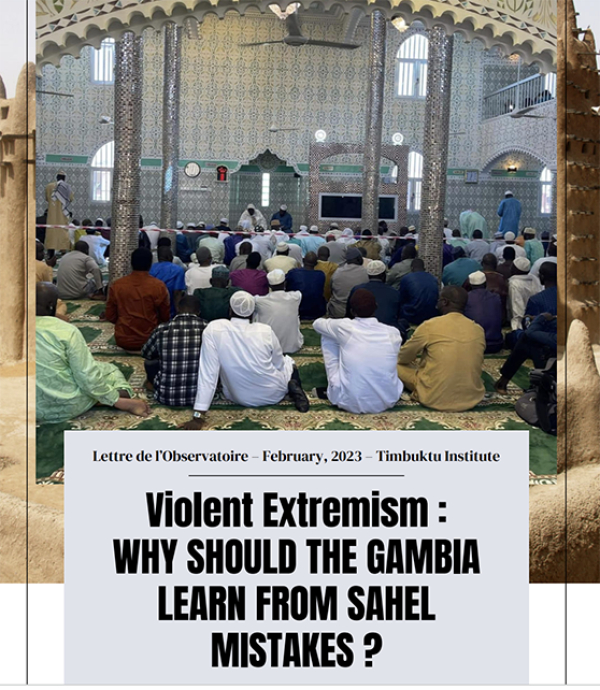Violent Extremism: WHY SHOULD THE GAMBIA LEARN FROM SAHEL MISTAKES? Spécial
Violent Extremism remains one of West Africa's most pressing security threats. Violent extremism is a phenomenon that threatens the peace and tranquility of different countries and has claimed the lives of millions of people around the world in recent years.
Radicalization has different forms and dimensions; religious, sectional and, sometimes, racial. Internationally and regionally, no country is left unchallenged about this phenomenon and the dangers it poses to society at large. Religious radicalization has captured the attention of the international community and poses a major threat to global peace and security; it winds have believed to have blown from the Arabic world and spread like wildfires in countries around the world. It should be remembered from the outset that the phenomenon of extremism is not unique to predominantly Muslim societies. It is a phenomenon that is experienced by all religions in different social contexts and geographical areas.
Since decades, West Africa and the sahel are at the forefront of radicalization thoughts and activities, primarily carried out by local actors and small theaters in the region. Groups such as Jamâat Nusrat Al-Islam Wal Muslimeen (JNIM) and Islamic State Sahel province (ISSP),which operates in Mali and Burkina Fasso, and Boko haram in Nigeria, among others, have been carryout terrorist activities in their respective countries and far beyond.
Unlike the countries of the central Sahel, some West African countries are still spared terrorist attacks, although they are gradually being marked by the rise of a certain radicalization. This trend can be seen in the behaviors, modes of religiosity, and speeches of new preachers who are increasingly influential among young people.
As observed in the recent evolution of the countries of the region, the hardening of the increasingly contentious religious discourse is also linked to interactions between the political and religious spheres. The specific case of the Gambia cannot be properly analyzed without taking into account the inconsistencies of Yayah Jammeh's regime as well as the influences coming from abroad, more specifically from the Middle East and the Gulf countries.
Radicalism perspectives in The Gambia
One will, without a second thought, negate the question of The Gambia being completely immune from all elements of Islamic radicalization. To begin with, Gambia is geographically located in a community of nations that share not only an open and porous border but also deeply ingrained values and religious brotherhoods. The independence of nations within the Sahel and West African countries has increased the possibilities of radicalization. As a Muslim-majority country that regained its democratic values following the highly controversial 2016 presidential elections which brought current president Adama Barrow to power. However, the Gambia is a very welcoming country,its citizens also travel to different predominantly Islamic countries notably Iran,Iraq and Syria to pursue Islamic and Coranic studies. There is still no concrete evidence as to what type of knowledge such Gambian receive when they reach those countries. Also, the lack of adequate vetting process put the country into serious threats of radicalization etc.
The other important element is that there exist many Quranic educational centres that are run outside the umbrella of the government and its agencies. One might find it difficult to ascertain the philosophy being inculcated in the minds of these knowledge seekers in these completely isolated Islamic and Quaranic establishments. A study of Government programs revealed a well-organized structure in place to moderate and monitor what happens in conventional and Arabic (Madarasas) schools, but until now little is known of the locally run "daara" which are mainly run under the watch of learned community leaders. This survey intends to detail elements of Islamic radicalization in the Gambia and aims to find linkages with groups in Sub-Saharan Africa and globally recognized radicalized groups.
Through an analysis of the recent dynamics of the Gambian religious field, this article will first look at the prospects of radicalism in the Gambia. After an examination of the management of religion during the Yaya Jammeh era, the evolution of the relationship between Islamic actors and the regime will be discussed, as well as the process that has seen the development of Wahhabi movements and the evolution of religious discourse. Finally, beyond a simple religious phenomenon, it will be discussed how the hardening of preaching could constitute early signals of radicalization in the Gambia and why this country should be able to learn from the mistakes of Sahelian states in the face of the rise of violent extremism.
